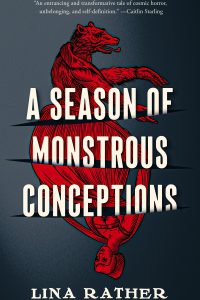Paul Di Filippo Reviews A Brief History of Living Forever by Jaroslav Kalfař
 A Brief History of Living Forever, Jaroslav Kalfař (Little, Brown 978-0316463188, trade paperback, 320pp, $28.00) March 2023
A Brief History of Living Forever, Jaroslav Kalfař (Little, Brown 978-0316463188, trade paperback, 320pp, $28.00) March 2023
In 2017 I was privileged to review Jaroslav Kalfař’s first novel for The Barnes & Noble Review. (I’d like to point you to the online text of that piece, but when the B&N Review shut down, they shortsightedly wiped their archives bare.) I found Kalfař’s impressive debut to be a Malzbergian journey unlike most American genre books. Here’s a small portion of my assessment.
Spaceman of Bohemia is most definitely not your standard Anglo-American science fiction. In its allegories about geopolitical power trips, it harks more closely to the work of the Strugatsky brothers. In its cognitive derangements and depictions of ontological levels of reality, it stands as a cousin to the work of Stanislaw Lem. The work of Gary Shteyngart—like Kalfař, a writer with a foot in both is his native country and his adopted one—might also come to mind…. [B]ravura metaphysical insights, matched with realpolitik drama…”
Kalfař mines much the same territory in his second novel. But because that particular literary country—genuinely weird speculative elements hybridized with naturalistic and engaging historical and contemporaneous narratives—is a broad, if not infinite realm, the book reads substantially differently than Spaceman, a cousin rather than a twin.
We start in the year 2029, in the Czech Republic, listening to the voice of Adéla Slavíková. A single woman in her later years, she lives with her elderly mother and her adult son, Roman. We sense immediately from hints that her current existence is kind of a holding pattern, after a life of much substance. On the day we meet her, Adéla gets a literal sentence of imminent death from her doctor and loses her job. She also has a visit from a talking mystical fish. All these portents and disasters point her in one direction: she must travel to the USA to find the daughter, Tereza, whom she gave up as an infant, and effect a reconciliation before Adéla dies. She knows how to find Tereza—her daughter is semi-famous, working for a big mysterious tech company named VITA—but there are other obstacles. The USA is now “the Reclamation.” Starting with the election of 2024, the country took a deep right-wing turn, with the usual fallout, including a hostility to foreigners. But with determination, Adéla gets her visa and soon comes face to face with her long-lost daughter. The meeting is a good one, the two women embrace, and have one splendid day together—
—and then Adéla dies, alone in her hotel room. Except that in her case, the cessation of bodily functions does not mean an end to her consciousness. She becomes a disembodied percipient of Tereza and the rest of the world, unable to communicate, but following subsequent events omnisciently. And this new state includes the ability to revisit her past. And so the narrative resumes, with alternating sections in the years 1978 to 1989 (Adéla’s backstory) and the overstuffed, tumultuous year of 2030, as Tereza struggles with the outcome of the death of the mother she hardly knew.
This all takes place in the first chapter, so I am not, I hope, majorly spoiling any suspense. The intriguing mysteries continue to unfurl along two paths: the retrospective biography of how Adéla became that lonely woman living in a small Czech village (long story short, she was a cosmopolitan rebel, artist and hellraiser); and the efforts of Tereza—later allied with her half-brother Roman—to battle the insidious forces which are looking, improbably, to benefit from Adéla’s death.
Kalfař followed a similar splitscreen approach in Spaceman, so let’s honor that by looking at the two halves of his story separately, while acknowledging that they complement each other nicely in a synergistic fashion, not the least important aspect of which is a mournful compare-and-contrast between the relatively innocent 1980s and the debauched 2030s.
In 2012, in the pages of The New Yorker, critic Adam Gopnik proclaimed: “So it seems time to pronounce a rule about American popular culture: the Golden Forty-Year Rule. The prime site of nostalgia is always whatever happened, or is thought to have happened, in the decade between forty and fifty years past.” This rule, as Gopnik further refines it, seems very useful to me, and explains in part the allure of this strand of Living Forever. Born in 1988, Kalfař was too young to have experienced that decade firsthand. But in turning back to his natal years, he recreates the period with empathy and vividness. The wacky druggy lifestyle, including a project to make a film version of War with the Newts, is spot on. The various heartaches and triumphs that Adéla undergoes are inextricably bound up in the culture of that time period.
As for the 2030s, Kalfař’s savage wit and attacks on the USA’s political insanities is counterbalanced by a certain droll urbanity. When Kalfař shows the Reclamation philosophy taking root just as easily in the Czech Republic as it did in the USA, the universality of human folly is fully highlighted and affirmed. Tereza’s bosses at VITA, the tech bro’s “Steven & Mark…boy billionaires…immortalists [with] the ultimate vision of the future…wherein human existence could be fully digitized,” are crippling analogues of Zuckerberg, Musk, Bezos and others.
Kalfař’s SF novums are solid as well. Tereza is tethered to her “hWisper” wrist communication device just as we all are currently to our phones. And the tech secret which ultimately and shockingly explains Adéla’s seemingly supernatural afterlife existence is well buttressed.
Ultimately, this tale of the way history inhabits humans and contours our lives is sad but hopeful, stirring and redemptive. As Adéla observes: “Blank slates are a kitsch sold at the dollar store, whereas every act in a human life is added to a tally carved in stone. What we’ve done cannot be undone. This is true not because of some biblical sense of divine justice, but because of the nature of human memory. We are our own history, we store our past actions within our bodies, whether we like it or not.”
 While you are here, please take a moment to support Locus with a one-time or recurring donation. We rely on reader donations to keep the magazine and site going, and would like to keep the site paywall free, but WE NEED YOUR FINANCIAL SUPPORT to continue quality coverage of the science fiction and fantasy field.
While you are here, please take a moment to support Locus with a one-time or recurring donation. We rely on reader donations to keep the magazine and site going, and would like to keep the site paywall free, but WE NEED YOUR FINANCIAL SUPPORT to continue quality coverage of the science fiction and fantasy field.
©Locus Magazine. Copyrighted material may not be republished without permission of LSFF.







